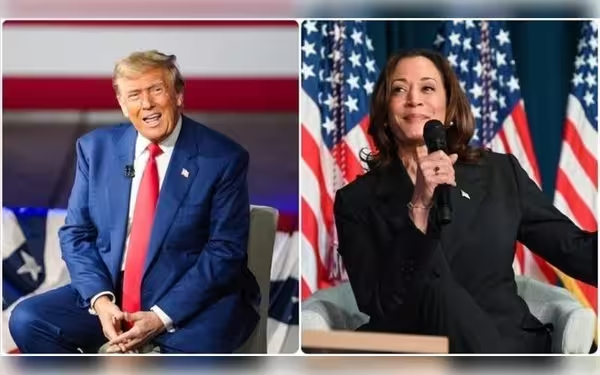Saturday, November 16, 2024 10:37 PM
Muslim Vote's Impact on 2024 US Election: Trump vs. Harris
- Muslim voters could sway key swing states.
- Harris leads Trump among Muslim voters significantly.
- Concerns over Gaza conflict influence voting decisions.
 Image Credits: nation_pk
Image Credits: nation_pkThe Muslim vote could be decisive in the 2024 US election, influencing key swing states and reflecting community concerns.
The upcoming 2024 US presidential election is shaping up to be a pivotal moment, particularly for the Muslim community in America. With Vice President Kamala Harris representing the Democratic Party and former President Donald Trump as the Republican nominee, the Muslim vote could play a crucial role in determining the outcome of the election. According to the Council on American-Islamic Relations (CAIR), there are approximately three and a half million registered Muslim voters across the United States. This demographic could significantly influence key swing states, which are essential for securing victory in the election.
Hussam Ayloush, the CEO of CAIR's California chapter, emphasized the importance of the Muslim vote, especially in swing states like Arizona, Georgia, Michigan, Nevada, Pennsylvania, and Wisconsin. He stated, "We do believe that those Muslim voters who reside in the swing states will have a major role in determining the election." This assertion highlights the potential impact of the Muslim community, which is one of several important voter blocs in the US, alongside African Americans, Asian Americans, and Hispanics.
Recent surveys conducted by CAIR indicate that Muslim voters tend to lean Democratic, with Harris currently leading Trump by a significant margin of 29.4% to 11.2%. However, the Green Party candidate, Jill Stein, is not far behind, trailing Harris by just 0.3%. Ayloush pointed out that Stein's strong stance on the ongoing conflict in Gaza has resonated with many Muslim voters, as she opposes what she describes as the "ongoing mass murder of Palestinians." This position starkly contrasts with the views of both Trump and Harris, with Trump being notably pro-Israel and Harris remaining somewhat ambiguous in her stance.
Ayloush raised critical questions that many Muslim voters are grappling with: "How can one vote when you can't tell who is actually the lesser of two evils?" This dilemma reflects the complex feelings within the Muslim community regarding their voting options. While it may not be realistic for a third-party candidate like Stein to win the presidency, her presence in the race could lead to a protest vote or even abstention from voting among Muslim voters, which could ultimately affect the election's outcome.
Political science professor Bob Stein highlighted the significance of Michigan in this election. He noted that the Muslim vote could be particularly impactful in areas with high concentrations of Arab and Muslim Americans. In the Democratic primary, Michigan saw upwards of 200,000 votes cast, and if this trend continues into the general election, it could sway the results. Stein pointed out that Michigan's voting patterns in the past have shown that even a small number of votes can make a significant difference, as seen in the 2020 election where Biden won by a mere 114,000 votes.
While the war in Gaza is undoubtedly a pressing issue for many Muslim voters, other factors such as the economy, immigration, and abortion will also play a role in their decision-making process. Harris will need to secure victories in not just Michigan, but also Pennsylvania and Wisconsin, to have a strong chance of winning the presidency. However, Stein believes that Harris could still win the election even if she loses Michigan, provided she performs well in other swing states.
As the election date approaches, it is clear that the Muslim vote could be a decisive factor in shaping the future of the United States. Voters within this community are faced with challenging choices, and their decisions will not only impact the presidential race but also reflect their hopes and concerns for the future. The outcome of this election will undoubtedly resonate far beyond the ballot box, influencing policies and attitudes towards the Muslim community in America for years to come.













